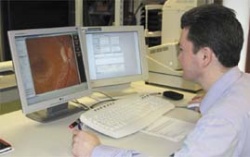Telemed screening for diabetic retinopathy
The United Kingdom's Diabetes Retinal Screening Service

The United Kingdom’s Diabetes Retinal Screening Service is a national screening programme that aims to screen 80% of the diabetic population by 2006 and 100% by 2007. The National Health Service (NHS) Purchasing and Supply Agency (PASA) has approved software from three companies for use in the programme.
The first major screening programme - to monitor the sight of 12,000 diabetics over a 12-month period - has successfully used secure messaging telemedicine to transfer digital images of patients’ retinas, combined with an electronic patient administration system, between computers used by opticians, hospitals and a screening administration centre within primary care trusts (PCTs).
This screening programme uses OptoMize iP software, developed by Cambridge-based university spin-off company Digital Healthcare, which specialises in software for diabetic retinal screening programmes and ophthalmology. The firm’s installations are used in hospitals and optician practices in the UK, as well as in private practices, hospitals and universities in the USA, with satellite usage in European countries, Australasia and the Far East.
The programme involves Preston and Chorley & South Ribble Primary Care Trusts, the Royal Preston Hospital and Chorley District Hospital, as well as 17 opticians practices across Preston, Chorley, Leyland and surrounding villages. It is encouraging all diabetics, over 12 years old, to have a their eyes screened.
The software has been installed on 48 computers in various locations across Central Lancashire so that patients can choose to be screened by an accredited optometrist in their locality or at a hospital eye clinic. Results are transferred electronically between the computers on the same network.
Janet Ashcroft, Health Improvement Manager at Preston PCT, said that the built-in information system handles data well ‘... so we have the capacity to provide a screening service annually instead of every two years.’
Alison Johnson, Head of Priority Clinical Services Development at Chorley & South Ribble PCT, pointed out that the software enables the use digital photography for retinal screening, in line with national diabetes screening requirements. ‘Our screening staff can use the software to manipulate and analyse images of each patient’s retina, and monitor changes by comparing retinal images taken at different points in time. They can also print the images to share with patients, involving them in their treatment. This is much more effective than conventional eye examinations with slit lamps, and film-based retinal images which can be less detailed and deteriorate over time. The software is also fully-automated so the screening administration staff can check patients’ progress through the system, and after screenings, they can automatically generate reports to patients and GPs, or referrals to ophthalmology clinics if further investigations are needed.’
Details: www.digital-healthcare.com
01.03.2006











